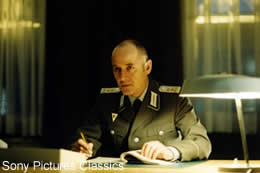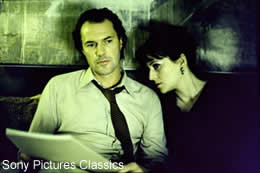 Showered in a multitude of praise, acclaim, and a whole list of awards from The European Film Award to recently an Academy Award nomination for Best Foreign Language Film, Director/Writer Florian Henckel von Donnersmarck delves into the past just prior to the fall of the Berlin Wall in 1989. Taking place in 1984 however, in “The Lives of Others”, East Germany’s “shield and sword”, the Secret Police/Stasi used surveillance mercilessly on the populace, leaving no stone unturned-ascertaining the most minute and personal information during a time where it was stated, “glasnost is nowhere in sight”.
Showered in a multitude of praise, acclaim, and a whole list of awards from The European Film Award to recently an Academy Award nomination for Best Foreign Language Film, Director/Writer Florian Henckel von Donnersmarck delves into the past just prior to the fall of the Berlin Wall in 1989. Taking place in 1984 however, in “The Lives of Others”, East Germany’s “shield and sword”, the Secret Police/Stasi used surveillance mercilessly on the populace, leaving no stone unturned-ascertaining the most minute and personal information during a time where it was stated, “glasnost is nowhere in sight”.
We open the film with an interrogation scene where a seemingly callous and by the book Stasi, Capt. Gerd Weisler (Ulrich Muhe), drills a suspect with methodical precision. Using this flawless interrogation as an exercise to train students, it is noted that the “enemies of socialism” must be weeded out and neutralized as State Security staunchly believes wholeheartedly. Weisler is such a  dedicated Stasi, a very black and white persona at the beginning of the story with no shades of grey in his personality. He’ll get the job done and will do it without emotion or thought of the consequences.
dedicated Stasi, a very black and white persona at the beginning of the story with no shades of grey in his personality. He’ll get the job done and will do it without emotion or thought of the consequences.
While viewing a theatre performance featuring noted playright Georg Dreyman (Sebastian Koch), it’s presumed by the Stasi that his pristine exterior may hold a shadowy undercurrent. Associating  with Dreyman is Christa Maria-Seisland (Martina Gedick) a star stage actress who is romantically linked to Dreyman.
with Dreyman is Christa Maria-Seisland (Martina Gedick) a star stage actress who is romantically linked to Dreyman.
Using this as a catalyst, both Weisler and his comrade- a more stoic and devious Lt. Col. Anton Grubitz (who is a senior officer in the Culture Dept.) initiate- Operation “Laszlo”, with the hopes of nailing something subversive on the playright as they begin to intertwine with his life through clandestine means. Joining the mix is Minister Bruno Hempf (Thomas Thieme), a portly kingpin and former Stasi now bigwig with a penchant for eroticism, giving the blessing for this wiring of Dreyman’s home. Weisler and light hearted partner Sgt. Leye, who takes over his shift (but arrives late every time) take night and day shifts eavesdropping becoming one with the lives of both Dreyman and Seisland who dwells with him.
When Hempf becomes infatuated with Christa, Weisler is ordered to eliminate the rival. Hempf keeps Christa on a very long lease and the draw to him is due to his supplying her with illegal drugs. Christa who essentially lacks self esteem feeds on the attention Hempf bestows upon her until that too becomes an addiction. Dreyman in the course of the story discovers this and urges her to leave him behind and find herself. Weisler becomes deeply engrossed with their day to day dealings so much to the point of weeping while surreptitiously cloaked with listening devices on, when Dreyman plays a evocative piano piece called, “Sonata for a Good Man”, given by a director friend of his- Albert Jerska who
his supplying her with illegal drugs. Christa who essentially lacks self esteem feeds on the attention Hempf bestows upon her until that too becomes an addiction. Dreyman in the course of the story discovers this and urges her to leave him behind and find herself. Weisler becomes deeply engrossed with their day to day dealings so much to the point of weeping while surreptitiously cloaked with listening devices on, when Dreyman plays a evocative piano piece called, “Sonata for a Good Man”, given by a director friend of his- Albert Jerska who  succumbed to committing suicide due to being fingered by the government.
succumbed to committing suicide due to being fingered by the government.
Moved in ways he for the first time has felt as a field officer, Weisler steps into an utter quagmire in his untainted career- torn between duty and the colorful lives he has come to know so intimately from the shadows. Always a stationary fly on the wall, we watch him as he physically enters and manipulates ultimately the motivations of Dreyman and Christa. 
The film from the very get go hooks you into its crafted, cerebral storyline. Weaved intricately and superbly, we emotionally become invested into each character’s rise and fall. Dramatic tension abound, yet with some notable dashes of humor sprinkled in, the film is sure to grab the attention of anyone craving a tightly executed plot which thickens with every scene change. Also notable is the chilling and at times icy soundtrack which adds a more suspenseful, potent dimension to the story. Sure to be a favorite of cloak and dagger enthusiasts, “The Lives of Others” is a film accomplishment… bar none.
Rating: A

